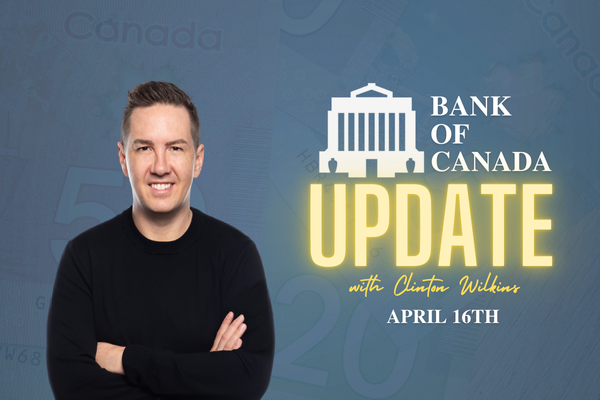On 95.7 News Radio, Clinton and Todd discussed the importance of credit monitoring due to rising fraud and data breaches.

News Update: 95.7 News Radio – Interest Rate Cuts – October 24th
Clinton joins Dan Ahlstrand on 95.7 News Radio to discuss the Bank of Canada’s recent half-percentage point interest rate cut and its implications. He highlighted that this cut signals further reductions to come, aiming to spur spending and control inflation.
Bank of Canada’s Interest Rate Cut and Its Implications
Dan Ahlstrand
What wasn’t foggy yesterday was the Bank of Canada claiming victory against high inflation on Wednesday, as it delivered a, as they’ve been calling it, a super-sized interest rate cut, and signaled its policy rate will likely to continue fall in the coming months. Clinton, welcome to the show. So, half a percentage point. You and I kind of talked about this a week or so ago. We kind of thought that was the way it was going to go. They’ve gone that way. But I think the bigger news is, is that they’re indicating that it’s not the end.
Clinton Wilkins
It’s going to keep on coming. And, you know, every economist was projecting a rate cut yesterday, which was great. I think some people were on the fence with whether it was going to be 25 basis points. And there were some of the economists at these big banks estimating even up to 100 basis points for a rate cut. You know, I think at a 50 basis point reduction, it really signals the optimism by the Bank of Canada that they need to start spurring some spending again. Now, we obviously still want to make sure that inflation is going to remain low. But the real outcome here, it’s going to reduce the cost of borrowing for consumers For existing homeowners it’s going to make a difference, especially if you’re in a variable rate mortgage. So if you have a variable rate mortgage, your payments either going to go down or your amortization is going to get shorter, or if you have any products like a home equity line of credit or any other unsecured type of debts, that cost of borrowing is going down as well, which is really great. I think the one thing that consumers need to remember is that fixed rates and variable rates move completely independently of each other. We kind of need to look and see what happened in the US, and I know we operate completely separate from the US, but you know, we need to look and see what they’re doing and how those impacts are happening. The Fed cut their rate by 50 basis points here not that long ago, but right after that happened, the fixed rates went up by 50 basis points. So I think a lot of consumers have this misconception that whatever happens with the Bank of Canada is going to impact fixed rates, and there’s no connection. The fixed rates are really tied to what’s going on in the bond market. And let me tell you, there’s a lot of pressure on the bond market. I wouldn’t be surprised if our fixed rates in Canada go up as well.
Dan Ahlstrand
Clinton, about a year ago, you and I were chatting, I think it was on the show, and people were biting the nails off their off their fingers, looking at these high rates and you had suggested that if you had to renew your mortgage , maybe looking at a short term like a fixed rate in one year. Those people are looking pretty smart now, considering the amount of reduction in rate we’ve seen over the last 12 months.
Clinton Wilkins
The majority of mortgages are coming out for renewal over the next couple of years. So I think some consumers are going to be renewing into much higher rates than what they had, and some consumers are going to be renewing into much lower rates, which is positive. You know, we were really worried about this renewal cliff that was coming with this signal from the Bank of Canada I think consumers are going to be more optimistic and a little bit less concerned going into a renewal type situation. But I really think it’s still important to look at your situation, specifically, everybody’s situation is different. Yes, consumers are taking some shorter term fixed. Majority of the ones that are taking shorter term, though Dan, are like a three year fixed. That’s probably more popular if you’re going to go short term. But now that this Bank of Canada has reduced the key overnight rate, which is going to impact the bank prime, more and more consumers are going to do a variable rate right now, a variable rate mortgage is still more expensive than any fix that we can get, but consumers, if they can really hold on, those rates will be less in one year time. So really, if they can take a higher rate today, it will pay off. But not everyone has necessarily the stomach for that.
Dan Ahlstrand
And the news yesterday that this is isn’t the end of it makes it more lucrative for somebody to maybe consider a variable rate more.
Clinton Wilkins
Even when the rates started being cut, so this is the fourth cut, and this is the biggest reduction since 2020. Once the rate started going down again from the Bank of Canada, that signal, more and more consumers were starting to take a variable rate mortgage. You know, I think it’s the consumers that are willing to take the risk and can take the risk now, not everyone can. Some people, as we need to remember, are at the very top of their budget, and they have to take a fixed rate just to be able to qualify with things like the stress test. But I think the more savvy consumers, and I think the consumers that have some room in their budget, they should and can take a variable certainly, it’s our recommendation for many customers. Myself, I’m in a variable rate mortgage. We talk about it a lot, even on Mortgage 101, I think it’s important to understand the nuances. And every product really is different. You know, a fixed rate is not for everyone. My concern right now is those borrowers that are taking a five-year fixed, which majority of Canadians historically have taken, 60% are taking a five year fixed. Those consumers if they need to break that mortgage early, just think, if these rates continue to go down, they could have much, much larger penalties if they break their mortgage early. I’ve seen, and I’ve been doing this for almost 20 years, I’ve seen consumers break their fixed rate mortgages early, with 10,20, 30,40, $50,000, penalties. So you need to remember, the bigger the spread between where your rate is and where the rates are, when you were to break it, and the amount of time you have left on your mortgage. Breaking a fixed rate mortgage early can be really devastating for a lot of people.
Real Estate Market Impact and Renewals
Dan Ahlstrand
Clinton, with money getting cheaper now, do you think that this is going to spur the real estate market in Nova, Scotia and in HRM in particular?
Clinton Wilkins
I think that there’s certainly some positive optimism. I think a lot of consumers were sitting on the fence just because the rates were high. I think the further the rates continue to be reduced, I think there’s going to be more and more demand in the marketplace, and I think it’s going to drive the prices up again. You know, we’re not in this 2021-2022 era here in Halifax, where there was the 20 offers on the properties. We’re not seeing that, but I do think that there were a lot of people that were not doing transactions over the last 18 months because they just said, Hey, the rates are high, I’m going to wait. Those are the ones that I think are going to start entering the market again. And I can tell you the activity that we’ve seen here in October. It feels like it’s June. It feels like we’re in the Summer market right now. And that might have just been muted. It maybe wasn’t as busy during the Summer, as you know, it normally would have been because of the rate environment, but I can tell you, it’s gangbusters right now. Certainly a lot of people are getting accepted offers, but I feel some people are just been waiting on their mortgage renewals. They were hoping that the rates would continue to go down. But you know, once that renewal date happens, you need to do something. So people, I think, were holding off maybe on doing transactions, and we’re seeing all types, like we’re seeing refinances, obviously we’re seeing renewals, and people are buying homes every single day.
Dan Ahlstrand
The new homes is my next question. And I know you’re the mortgage expert, but obviously you keep a pretty close eye on what’s happening in the real estate market. I saw some data last week or the week before that that single home starts in Nova Scotia are dropping every year, and we’re getting more and more and more apartments on to the market. Take a look around. Well, if it’s not foggy, take a look around the north end, and you can see all these these buildings going up. And they’re not condos, they’re apartments. Is it difficult to get a single family home now, and are the prices high because of that?
Clinton Wilkins
I think it is challenging. You know, there’s more demand in the marketplace than there is supply, and that naturally will drive the price up. That’s just the reality. But the more apartments that are being built, Dan means that there will be more inventory eventually available. Just think about that little old lady in the little old band that really wants to go into an apartment, but there were no apartments to rent, right? So that’s part of the challenge. And I think we are just so focused on the real estate being unattainable from a price point perspective, like we’re looking at, you know, apartments even next door to the studio, and they’re 2,3,4, $5,000, a month. We need to remember that the people that are moving into those units are freeing up a unit, usually at a lower cost and it could also be people selling a house to move into these types of units. So all types of construction, I think, are positive at all price points. We just need more units of all shapes and sizes and prices here in Halifax, and we’re going to need to build a lot more than we’re building right now. You know, we need to be building single family, town homes, condos, apartments. It needs to be of all types of inventory. We need to be doubling, tripling down. And I think some of the announcements from the Federal government, it’s going to help incentivize builders. And I expect, you know, going into 2025, 2026 and future, we’re going to see more involvement from the federal government perspective in the housing market, working with builders, provinces and municipalities to get those shovels in the ground.
Dan Ahlstrand
Crystal Ball question. We know that the the Bank of Canada has indicated that we’re not done yet. Is there a is there a target? Is there a number that folks in your industry are looking at is as where we’re going to bottom out?
Clinton Wilkins
Well, I can tell you my kind of estimate before the rates even started dropping, I said, You know what? They’re gonna drop 100 basis points this year and 100 basis points next year. Well, we’re already now at 125 right? So it’s exceeded my expectation. There are some economists, a couple of the banks came out this week before the renouncement even happened, saying that by the end of next year, they’re expecting, like, even up to a 200 basis point cut. So certainly, stay tuned. I think we’re getting into some interesting territory. And right now, mortgages, by and large, if you’re in a fixed rate, that’s probably starting with a four in a variable, you’re might be high fours, low fives. They’re moving in the right direction. But I think by the end of next year, we’re going to see a lot of mortgages in that 3% range, which, I think, is kind of that balance between being inflationary and causing that recession. So I think it’s we’re going to be in a more balanced environment from a rate perspective. And I think that’s going to be positive for Canadians, positive for homeowners, and also positive for people that are getting into the real estate market. As we know, it’s been very challenging for first-ime homebuyers, but certainly some good programs coming out later this year and into next year that I think is going to make homeownership more possible for a lot of people.
Dan Ahlstrand
For those that are on the sideline, maybe now’s the time and they want some more information. How do they get a hold of you?
Clinton Wilkins
They can check us out online at Teamclinton.ca/radio, lots of great information on there. You and I are doing a show our Mortgage 101, Dan has graciously volunteered to do our kickoff for Financial Literacy Month. November is Financial Literacy Month, and we have a really great show geared up, and it’s going to be on the first weekend of November. So I think we have a lot of great information on as well.
Dan Ahlstrand
That’s Clinton Wilkins and team.


